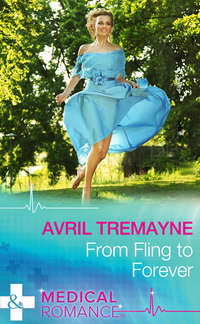
Полная версия
From Fling to Forever
And then she’d found Sann in a Cambodian orphanage, and life had beckoned to her again. Two years old, and hers. Or so she’d hoped. But he’d been taken too. He’d died, on her twenty-sixth birthday.
And now here she was on her twenty-seventh birthday. Still in limbo, with no idea of what had happened to Javier. Still grieving for Sann.
Panicking at the thought of seeing an Asian child with an adoptive parent.
Unable to entertain even the thought of a relationship with a man.
Pretending she was calm and in control when she was a basket case.
Her life had become a series of shambolic episodes. Too many drinks at the bar. Getting picked up by strange men, determined to see it through then backing out. Always backing out, like the worst kind of tease, because no matter how desperate she was to feel something, the guilt was always stronger. Coping, but only just, with endlessly sad thoughts during the day and debilitating dreams at night.
She knew that something in her was lost—but she just didn’t know how to find it. She hid it from the people she cared about because she knew her grief would devastate them. She hid it from her colleagues because they didn’t need the extra burden.
And she was just … stuck. Stuck on past heartbreaks. And it was starting to show.
No wonder Aaron James abhorred the idea of a ‘relationship’ with her.
Ella rubbed tiredly at her forehead. She closed her eyes, longing for sleep, but knowing the nightmares would come tonight.
Dr Seng slapped his hand on the desk and Aaron’s wandering mind snapped back to him. ‘So—we’ve talked about malaria. Now, a few facts about the hospital.’
Kiri had been whisked off to do some painting—one of his favourite pastimes—on arrival at the Children’s Community Friendship Hospital, so Aaron could concentrate on this first meeting.
But he wasn’t finding it easy.
He had a feeling … A picture of Ella here. Was this where she was working? He wasn’t sure, but he kept expecting her to sashay past.
Dr Seng handed over an array of brochures. ‘Pre-Pol Pot, there were more than five hundred doctors practising in Cambodia,’ Dr Seng said. ‘By the time the Khmer Rouge fled Cambodia in 1979 there were less than fifty. Can you imagine what it must have been like? Rebuilding an entire healthcare system from the ground up, with almost no money, no skills? Because that’s what happened in Cambodia.’
Aaron knew the history—he’d made it his business to know, because of Kiri. But he could never come to terms with the brutal stupidity of the Khmer Rouge. ‘No, I can’t imagine it,’ he said simply. ‘And I’d say this hospital is something of a miracle.’
‘Yes. We were started by philanthropists and we’re kept going by donations—which is why we are so happy to be associated with your documentary: we need all the publicity we can get, to keep attracting money. It costs us less than twenty-five dollars to treat a child. Only fifty dollars to operate. Unheard of in your world. But, of course, we have so many to help.’
‘But your patients pay nothing, right?’
‘Correct. Our patients are from impoverished communities and are treated free, although they contribute if they can.’
‘And your staff …?’
‘In the early days the hospital relied on staff from overseas, but today we are almost exclusively Khmer. And we’re a teaching hospital—we train healthcare workers from all over the country. That’s a huge success story.’
‘So you don’t have any overseas staff here at the moment?’
‘Actually, we do. Not paid staff—volunteers.’
‘Doctors?’
‘We have a group of doctors from Singapore coming in a few months’ time to perform heart surgeries. And at the moment we have three nurses, all from America, helping out.’
‘I was wondering if …’ Aaron cleared his throat. ‘If perhaps Ella Reynolds was working here?’
Dr Seng looked at him in surprise. ‘Ella? Why, yes!’
Ahhhhh. Fate. It had a lot to answer for.
‘I—I’m a friend. Of the family,’ Aaron explained.
‘Then I’m sorry to say you probably won’t see her. She’s not well. She won’t be in for the whole week.’
Aaron knew he should be feeling relieved. He could have a nice easy week of filming, with no cutting comments, no tattoo come-ons, no amused eyebrow-raising.
But … what did ‘not well’ mean? Head cold? Sprained toe? Cancer? Liver failure? Amputation? ‘Not well?’
‘Dengue fever—we’re in the middle of an outbreak, I’m afraid. Maybe a subject for your next documentary, given it’s endemic in at least a hundred countries and infects up to a hundred million people a year.’
Alarm bells. ‘But it doesn’t kill you, right?’
‘It certainly can,’ the doctor said, too easily, clearly not understanding Aaron’s need for reassurance.
Aaron swallowed. ‘But … Ella …’
‘Ella? No, no, no. She isn’t going to die. The faster you’re diagnosed and treated the better, and she diagnosed herself very quickly. It’s more dangerous for children, which Ella is not. And much more dangerous if you’ve had it before, which Ella has not.’
Better. But not quite good enough. ‘So is she in hospital?’
‘Not necessary at this stage. There’s no cure; you just have to nurse the symptoms—take painkillers, keep up the fluids, watch for signs of internal bleeding, which would mean it was dengue haemorrhagic fever—very serious! But Ella knows what she’s doing, and she has a friend staying close by, one of the nurses. And I’ll be monitoring her as well. A shame it hit her on her birthday.’
‘Birthday?’
‘Two days ago. Do you want me to get a message to her?’
‘No, that’s fine,’ Aaron said hurriedly. ‘Maybe I’ll see her before I head home to Sydney.’
‘Then let’s collect Kiri and I’ll have you both taken on a tour of our facilities.’
It quickly became clear that it was Kiri, not Aaron, who was the celebrity in the hospital. He seemed to fascinate people with his Cambodian Australian-ness, and he was equally fascinated in return. He got the hang of the satu—the graceful greeting where you placed your palms together and bowed your head—and looked utterly natural doing it. It soothed Aaron’s conscience, which had been uneasy about bringing him.
They were taken to observe the frenetic outpatient department, which Aaron was stunned to learn saw more than five hundred patients a day in a kind of triage arrangement.
The low acuity unit, where he saw his first malaria patients, a sardine can’s worth of dengue sufferers, and children with assorted other conditions, including TB, pneumonia, malnutrition, HIV/AIDS and meningitis.
The emergency room, where premature babies and critically ill children were treated for sepsis, severe asthma, and on and on and on.
Then the air-conditioned intensive care unit, which offered mechanical ventilation, blood gas analysis and inotropes—not that Aaron had a clue what that meant. It looked like the Starship Enterprise in contrast to the mats laid out for the overflow of dengue sufferers in the fan-cooled hospital corridors.
The tour wrapped up with a walk through the basic but well-used teaching rooms, some of which had been turned into makeshift wards to cope with the dengue rush.
And then, to Aaron’s intense annoyance, his focus snapped straight back to Ella.
Tina and Brand would expect him to check on her, right?
And, okay, he wanted to make sure for himself that she was going to recover as quickly and easily as Dr Seng seemed to think.
One visit to ease his conscience, and he would put Ella Reynolds into his mental lockbox of almost-mistakes and double-padlock the thing.
And so, forty minutes after leaving the hospital, with Kiri safely in Jenny’s care at the hotel, he found himself outside Ella’s guesthouse, coercing her room number from one of the other boarders, and treading up the stairs.
Конец ознакомительного фрагмента.
Текст предоставлен ООО «ЛитРес».
Прочитайте эту книгу целиком, купив полную легальную версию на ЛитРес.
Безопасно оплатить книгу можно банковской картой Visa, MasterCard, Maestro, со счета мобильного телефона, с платежного терминала, в салоне МТС или Связной, через PayPal, WebMoney, Яндекс.Деньги, QIWI Кошелек, бонусными картами или другим удобным Вам способом.










